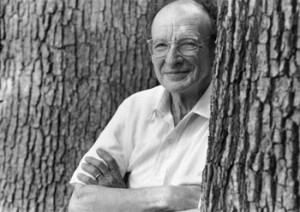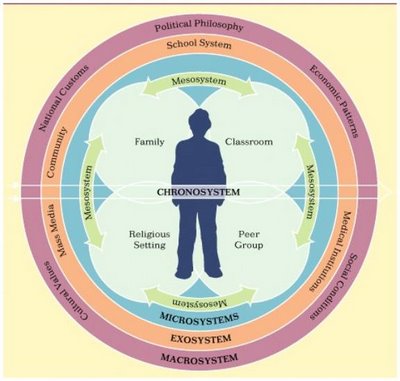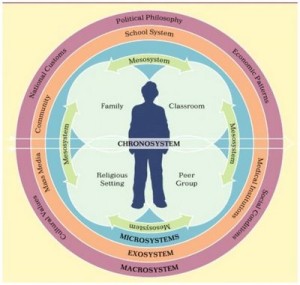A brief summary of Urie Bronfenbrenner’s theory on child development and the impact of parent involvement.
 As many of us have already figured out, children do not exist in their own tiny bubble unaffected by family, peers, teachers and community culture. In fact it is quite the opposite. We understand that our children and students are greatly impacted by the world around them. The well known human development Psychologist Urie Bronfenbrenner outlined the impact of parent involvement at schools and the other surrounding influences on a child’s development in his Ecological Systems Theory of Development.
As many of us have already figured out, children do not exist in their own tiny bubble unaffected by family, peers, teachers and community culture. In fact it is quite the opposite. We understand that our children and students are greatly impacted by the world around them. The well known human development Psychologist Urie Bronfenbrenner outlined the impact of parent involvement at schools and the other surrounding influences on a child’s development in his Ecological Systems Theory of Development.
Like fish in the ocean, people exist as part of an ecosystem, with each person having their own immediate social “microsystem”. Parents, teachers and caregivers are all a part of this “microsystem” and positive interactions between these parts will create balance for an individual’s growth and learning. These vital interactions are all part of an individual’s “mesosystem”. For example, when parents and teachers communicate directly and work towards shared goals, such as, encouraging a child’s interest in reading, practicing an instrument for the school concert or raising a grade from C to B, children can rely on their support system and feel more confident in creating and pursuing goals.
On the other hand, when the music teacher tells her student to practice at least one hour a day but mom and dad make a no music rule at home, conflicting influences hinder the child’s “mesosystem” and cause dysfunction to his/her overall development.
So what can parents and schools do to optimize the impact of parent involvement on a child’s ecosystem?
- Create a functional system to stay updated on daily happenings at home/school.
- Communicate needs and priorities directly to other important adults – i.e. parents can inform teachers of important family events that might impact school performance/attendance.
- Share student schedules (including class trips, school events and major assignments) and make them accessible to all parties so everyone can stay in the loop.
- Get to know each other! Ask questions and share feedback on children’s individual likes/dislikes, home culture, strengths and needs.
It’s easy to get caught up in our own daily happenings and forget how much our bubble really does overlap with many other loops in a child/student’s life. Thinking about Bronfenbrenner’s ecological theory can help us remember that we are part of a community and don’t have to do it all on our own! Teachers, parents and youth organizations are all impacting children’s development on a daily basis. Why not work together as much as possible to help them succeed?
Kyla Landon BA, RECE
Kyla Landon holds a bachelor’s degree in early childhood studies and is a registered early childhood educator in Toronto, Ontario.


